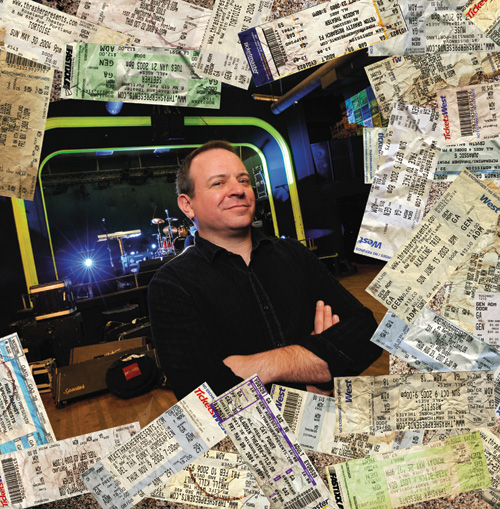 Portland music promoter Mike Thrasher has become one of the biggest concert promoters in the Northwest with his stealthy street-level marketing.
Portland music promoter Mike Thrasher has become one of the biggest concert promoters in the Northwest with his stealthy street-level marketing.
STORY BY JENNIFER NETHERBY // PHOTOS BY ANTHONY PIDGEON
October is one of the busiest months for concert promoters. College students are back at school and summer’s good weather has passed. Portland promoter Mike Thrasher Presents put on 75 shows in Portland and Seattle in that month alone in 2010. For each one, a group of high school and college-aged volunteers, members of Thrasher’s street team, hit concerts, schools and neighborhood record shops passing out flyers to get the word out. Marketers, meanwhile, mailed concert flyers to a network of tattoo and piercing shops, pizzerias, cafes and other businesses that have agreed to hang them up for customers. Those marketers also hype the shows on Facebook, Twitter, blogs, even buying Google Adwords for bands to find every potential audience member.
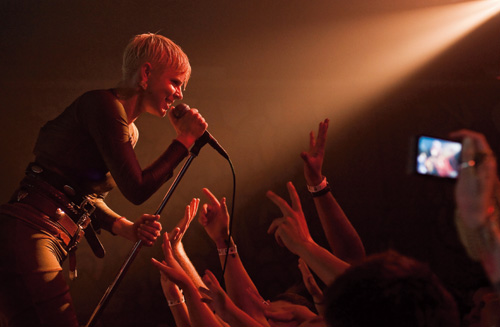 |
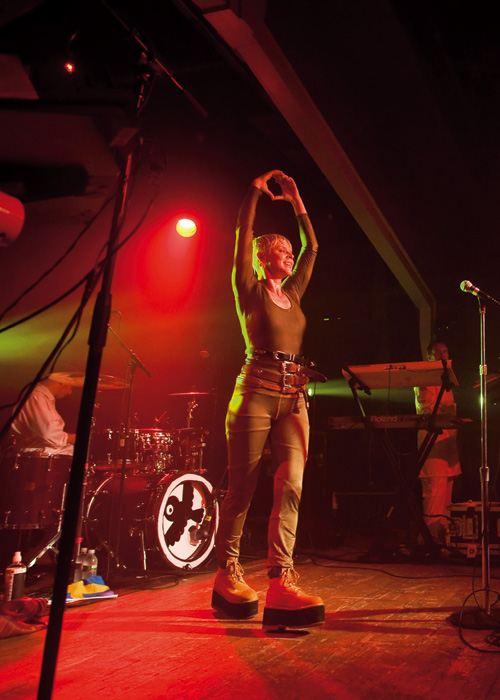 |
The Swedish pop star Robyn packs a December 2010 show at the Wonder Ballroom in North Portland. |
It’s this marketing machine that has helped make Mike Thrasher Presents one of the biggest concert promoters in the Northwest and a recognized name among indie, punk and metal music fans.
Leading the effort is the man himself, a 39-year-old former punk rock kid who works from the company’s Northeast Portland office, an easy-to-miss bungalow on a residential street behind the Wonder Ballroom that’s denoted by a small Mike Thrasher Presents sign near the front door. Inside, the office is functionally furnished with a couple concert posters on the wall from years past. From here Thrasher negotiates with agents and band managers to book talent and plan marketing strategy for each new show his company promotes.
In the next few months, Mike Thrasher Presents will put on concerts in Portland and Seattle with better-known acts that include the pop band Chromeo, heavy metal group Danzig, punk bands Social Distortion and Bad Religion, and dozens more largely-unheard-of punk, metal and indie artists. With nearly 400 concerts a year, Thrasher is one of the top promoters in the country. In 2009, he sold 201,309 tickets, ranking him the 29th top U.S. promoter, just behind Portland’s Mark Adler/True West and ahead of other local competitors Monqui Presents and Double Tee Concerts, according to industry trade magazine Pollstar. In December, Thrasher launched Cascade Tickets, a concert-ticketing service that will handle sales for McMenamins venues and compete with the newly merged Ticketmaster/Live Nation in the Northwest. Thrasher promises to eliminate “pre-order fees” and lower service fees that he says have frustrated concertgoers.
Unlike local competitors who own their own venues (Adler owns the Aladdin Theater, Monqui the Doug Fir Lounge), Thrasher has built a successful business out of putting on hundreds of shows a year with mostly up-and-coming musicians at different clubs across Portland and Seattle. Those who work with him credit it to the stealthy street team he created and his work ethic.
For someone who has made a name for himself in the Northwest through his marketing prowess, Thrasher the man comes off as more guarded, answering questions about his business in a matter-of-fact way, without elaborating. When asked whether he has crazy stories about artist requests on concert riders, he says yes, but doesn’t divulge any.
But he clearly knows his business down to the smallest detail, rattling off seating at venues around town off the top of his head.
“He’s very knowledgeable about his skill,” says Trevor Solomon, who started out as an intern for Thrasher in 1999 and worked for him for six years before moving to Willamette Week to head its Music Festival Northwest. Thrasher, he says, is “very sweet but at the same time, he’s very intense about how he wants things done and wants things done in a certain fashion. He’s very thorough and he cares — that’s the best thing. He cares about the concert, agents, the people working for him and he cares about the consumer.”
Thrasher started putting together shows as a side project at EJ’s, a club he worked at in the mid-90s while playing in local bands. Growing up in Portland, he says he always knew he wanted to work in music and for himself. “I was better at business than playing guitar,” he says.
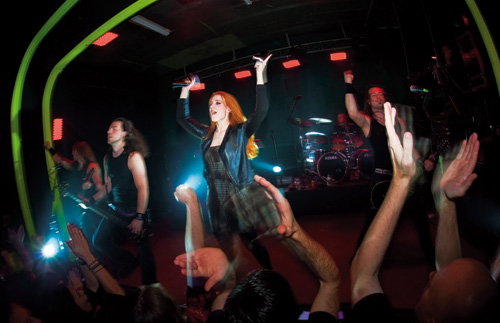 |
The Dutch metal band Epica rocks the house at the Hawthorne Theater during a typically packed show organized by Thrasher. Thrasher Presents specializes in punk, metal and indie artists. |
EJ’s didn’t have live music when Thrasher started but the alternative scene was starting to pop up in Seattle and Portland had its own cumulus of alternative bands on the verge of breaking. Thrasher brought in the Cherry Poppin’ Daddy’s, Hippo and Heavy, and the bands brought in customers. As the bigger live venues in town booked up, Thrasher started signing national bands that couldn’t get in elsewhere.
Slowly, he started booking bands at other venues around town, and three years after his first show at EJ’s, Thrasher set out on his own. At EJ’s, the goal was always to get people in to buy drinks at the bar. When he switched to full-time promoting, the goal became selling tickets to shows. To attract the widest audience possible, Thrasher started throwing all-ages shows, something that’s remained the majority of his business.
He’s also stuck to working with under-the-radar bands at smaller venues, something that has allowed him to take advantage of changes in the music and promotion business over the last decade. The biggest musical acts these days are selling fewer records than ever before and touring has become one of the main ways musicians make a living. That means the concert business, once dominated by big acts playing — and selling out — the biggest venues in town, is now cluttered with not-so-big acts that tour more than ever and play smaller clubs. These days, selling more tickets means booking more shows to a large extent.
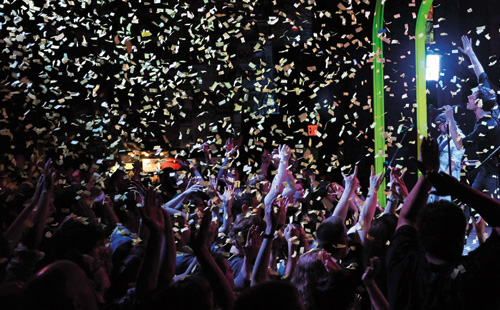 |
The indie band OK GO has built an ongoing relationship with Thrasher. The band played the Hawthorne Theater in May and returned to film a commercial in Portland in July. |
Thrasher was one of the first promoters in town to successfully navigate the new order.
“He’s the first one I’ve ever seen that became a strong independent presence based on starting from that format,” says David Leiken, owner of the Roseland Theater and Double Tee, Portland’s longest-running promotion company. Leiken started in the 1970s and has focused on bringing in the biggest acts. “Mike, I think, was the first one to develop his niche in the smaller rooms and create a business model that worked. I would have never wanted to do that necessarily. For me, I look at it and I think, ‘Jeez, that kid works his fingers to the bone.’”
Thrasher has done it by focusing on specific genres and building up his street team so that the Mike Thrasher Presents name is recognizable to devoted fans of indie, punk, metal and electronica music looking to hear the latest buzz band.
“He’s got the best street team in Portland,” Solomon says. “If you’re a punk rock kid you know Mike Thrasher shows. If you’re an indie kid, you go to see what’s the next hot thing coming up.”
The biggest part of Thrasher’s business is promoting, or what he calls community outreach. When he started, selling tickets meant buying print and radio ads. These days it means reaching out to audiences where they are — blogs, Facebook, MySpace, Twitter — and partnering for ticket giveaways with local businesses and groups like Bishop’s barbershops, roller derby team Rose City Rollers and radio stations.
Thrasher prefers to work with smaller bands playing smaller venues that fit 1,500 people, not 10,000, particularly in this economy. “I’m gun shy on arena shows,” he says. “It’s a lot of risk.”
It also allows him to grow with a band, as he’s done with the Killers and the White Stripes, two groups he brought to town when they were largely unknown and worked with again once they hit big. When the Killers first came through town, Thrasher did their show at Dante’s, a small downtown club in Portland. Then they broke and came back, again working with Thrasher, this time for a show at the Rose Garden. When lead singer Brandon Flowers came through Portland in November on a tour for his solo effort, Thrasher put on his show at the Roseland.
Picking the acts on their way to fame and not headed for obscurity is an art in itself, particularly as record sales, which once were a reliable guide, continue to slide. Thrasher says he partly bases it on relationships with agents he’s worked with before and trusts, partly based on record sales and radio play, and partly on Internet success and blog traffic the band generates. “The best indicator is past track record, then solid representation, a good label,” he says.
A promoter’s job involves everything from negotiating with band managers and agents on musician fees (which can range from $100 to $100,000 depending on the group and the venue), selecting venues and setting ticket prices to the smaller details involved in putting on a concert such as getting the band dinner. In the early years, Thrasher was a one-man operation, handling every aspect.
“Early on Mike was at every show. That’ll burn you out quick,” Leiken says. “I have respect for it. I’ve been there and done that. I understand what it means to be in Medford, to close a show, get up at 5 a.m., drive to the next place and do it again and do it six nights in a row like that.”
These days Thrasher mainly works in the office, negotiating deals with agents and leading marketing efforts. His company employs four production managers, six office staffers and three marketers.
Thrasher’s team, like other promoters and venues in town, is working harder than ever to sell concert tickets.
 |
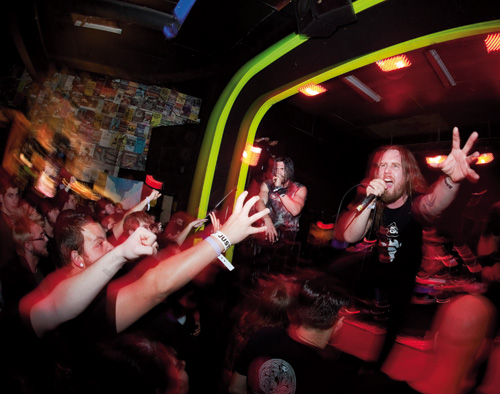 |
Scar Symmetry plays a show at the Hawthorne Theater in December 2010. Thrasher is an investor in the Hawthorne. |
“I can see from my vantage point better than most,” Roseland owner Leiken says. “I can see when people are spending money and I can see when they’re getting choosy. Right now they’re getting choosy. The kid going to multiple shows six months ago is now going to one.”
Thrasher has responded by cutting back on the number of shows he does from a peak of 511 in 2008 to 382 in 2010. While the change was partly due to the economy, he says at their height, “We were competing with our own shows.”
He also has negotiated lower ticket prices with bands, sometimes by getting groups to play smaller venues that are more likely to sell out, lowering his risk. The latter can work out better financially for both parties, he says. Fans are sometimes willing to pay more for tickets to see their favorite group in a more intimate setting and it can boost the image of the band, which is more likely to quickly sell out a smaller club, he says.
When the Black Keys came to Portland earlier this year, they originally wanted to play Arlene Schnitzer Concert Hall, which seats 2,700. Because of a scheduling conflict, Thrasher booked them two nights at the Crystal Ballroom, which seats 1,500 and is less expensive. Both shows sold out the first week, which encouraged the band to return for another show in December.
To make sure that show sold out, as he does for every show, Thrasher turned to his street team.
“This is a guy that’s been around and he’s built himself up from nothing,” Solomon says. “He has not just built a name for himself but Mike Thrasher shows, people know Mike Thrasher shows.”


